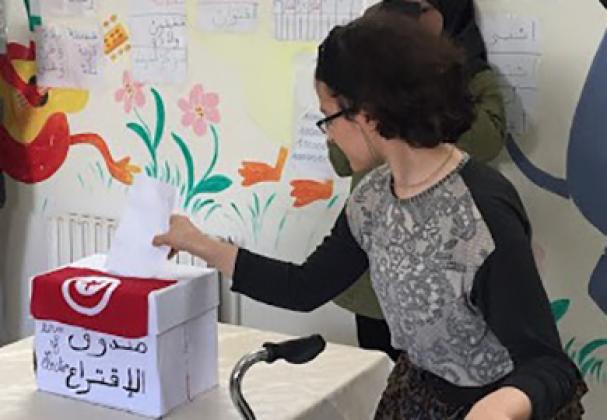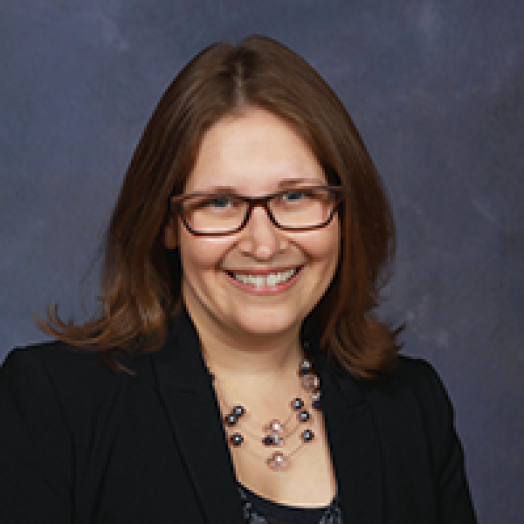
Assessing Access and Barriers to Political Participation for Tunisians with Disabilities
During the May 2018 municipal elections in Tunisia, the International Foundation for Electoral Systems (IFES) conducted an assessment of access and political barriers encountered by women and men with disabilities with support from the United States Agency for International Development. Utilizing IFES’ Intersectionality Assessment Framework, IFES Inclusion Advisor Virginia Atkinson, Deputy Director for the Middle East and North Africa Ambar Zobairi, Outreach Manager Khameyel Fenniche and Tunisian disability rights advocate Imed Ouertani conducted a series of key informant interviews with government and civil society, as well as focus group discussions with men and women with and without disabilities.
IFES’ Intersectionality Assessment Framework was adapted for use in Tunisia, where a significant percentage of the population has low literacy. People with disabilities often have low rates of literacy as a result of lack of access to education. Images were added to key activities in the focus group discussions so that information was not just conveyed with words.
The main findings from the assessment were:
- The Tunisian Independent High Authority of Elections (ISIE) implemented numerous inclusive initiatives for the municipal elections. However, these initiatives were implemented late in the process of organizing the elections and were not effectively communicated to the disability rights community, so they were not fully effective.
- The new disability quota resulted in 144 people with disabilities winning seats in municipal councils. However, the disability community is divided on the quota enforcement mechanism, and many newly elected officials with disabilities require capacity building to be able to more effectively take on their roles and responsibilities.
- Women with disabilities and the Deaf community are exceptionally marginalized from political life.
The ISIE, with support from IFES, developed tactile ballot guides and candidates lists in braille, posted audio versions of the candidate lists on their website, displayed posters describing the voting process in sign language at polling stations and created a voter mobilization video featuring actors with disabilities. However, these initiatives were not completed with enough time before the election for voters with disabilities to familiarize themselves with the tools, and the ISIE did not launch a campaign to ensure voters were aware of the resources.
This election was the first conducted since a new disability quota was introduced by Parliament. There were 1,740 candidates with a disability out of 53,675 candidates in total, 144 were elected and 18 people with disabilities served as heads of lists. Under the new quota, the first 10 people on each party list must now include one person with a disability or the party will not receive government funding. The penalty divided the disability community, with some people pleased with the financial penalty and others concerned that the disability quota does not have parity with the gender quota, which stipulates that parties are disqualified if they do not comply. One disability rights advocate said, “people with disabilities now seem like merchandise to be bought and sold because of the quota’s link to public funding.”
“How can I participate in political life when I am unable to participate in life? My father tells me about politics so what is the benefit of me contributing to political life?”
– Deaf Tunisian woman
Focus group discussions, which explored perceptions and opinions, provided insights into participation but were not representative of the community. Even among politically active focus group participants, women with disabilities were least likely to have voted in the municipal elections, with 67 percent of women with disabilities saying they voted. Eighty-two percent of men with disabilities voted and 100 percent of persons without disabilities voted. No women with disabilities reported that they were a member of a political party, had a government job, or were a candidate for office. Men with disabilities and people without disabilities reported that they were involved in a party (9%; 38%), had a government job (55%; 25%), or ran for office (27%; 13%). All men with disabilities who took part in the focus group said that they see themselves as leaders in their communities, including 82 percent who strongly agreed with the statement. Only half of women with disabilities said they agreed with the statement, and none strongly agreed.
Political Participation of Women and Men with Disabilities in Tunisia: An IFES Assessment is available for download in English and Arabic and in Arabic audio format. IFES will use the findings from this assessment to develop targeted disability inclusion initiatives ahead of the 2019 presidential and parliamentary elections in Tunisia.











